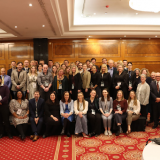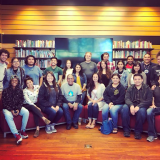So you’re in an MFA program–now what? A guest post by MA/MFA Candidate Candice Yacono
April 2, 2019
From Mid-Career to MFA (Part 3)
By Candice Yacono
Whether you’re a returning student or moved into graduate school straight from undergrad, it’s important to be clear about your goals for the MFA in Creative Writing, whether they are to publish a novel, to teach creative writing, or to make professional contacts. Check in with yourself and review your goals regularly, just as you would at your job. At the same time, remain flexible and strive to take advantage of new opportunities.
One thing I realized right away about Chapman University’s MFA is that a key aspect of a full-residency graduate program is its student life. I try to participate in informal events as much as I’m able. I know that the relationships I’m forging now may become lifelong. Most MFA programs have an active social life, but individual students must decide how much they want to take part. If late-night parties aren’t your thing or you have family obligations, select a few activities carefully.
Here at Chapman, it’s also easy to develop an activity yourself that’s in line with your schedule and preferences. Since some of us work full-time, a Facebook invite to go to the beach on a Thursday can inspire envy of what looks like a carefree, spontaneous lifestyle. But we might carve out an hour before or after class to meet classmates for coffee or dessert. And there are events built into the program, like the Pub(lishing) Crawl on April 16 this year or the WordTheatre performance each semester.
Of course, we don’t know each other’s circumstances in full. Other students might envy those of us who work full-time. We have professional successes and regular paychecks. Envy needs to be beside the point as we all work together to become better writers. In fact, being immersed in such a variety of viewpoints is one of the hallmarks of the MFA experience. Be open to new perspectives, experiences, and ideas.
The Chapman MFA experience stretches far outside the classroom, if you’re open to opportunities. Faculty here are generous with their time and a are wealth of information and guidance.
The international Anastamos interdisciplinary journal is run entirely by graduate students, and puts MFA students in collaboration with graduate students in other fields. In addition, several nonprofit volunteer opportunities are put together by faculty and students. Those of us who bring more life and career experience may be an asset when tutoring local high school students and working with incarcerated or at-risk youth.
Opportunities like thesis “boot camps” or manuscript consultations with professional writers pop up regularly. I try to rearrange my schedule to take advantage of as many as I’m able. Likewise, there’s GUS, which I’ve never seen at any other university. These are a series of one-time, three-hour class sessions on a variety of special topics. They’re zero credit, which means they are free to graduate students and go on one’s transcript. Over the last year, there have been several geared toward creative writing but also sessions on podcasts, TED Talks, and LinkedIn.
Some us go to the Association of Writers and Writing Programs (AWP) conference to attend panels and readings, and to staff the Chapman University booth. Twenty of us are traveling to Portland this year, all with partial travel support from Chapman University. Students have come up with some innovative ways to share travel costs. AWP is a great opportunity to meet other writers and editors. Funding is also available for MFA students to conduct research and creative activity on our projects. And last year, the program launched a collaboration with Dorland Mountain Arts Colony to send two students working on their thesis projects for one-week residencies.
The MFA years can be a refuge from the rat race, even if it’s just a few hours each week for those of us with full-time jobs. The MFA at Chapman University has become a place for me to perfect my craft, challenge my beliefs, and share a classroom with people who are just as in love with language as I am.

